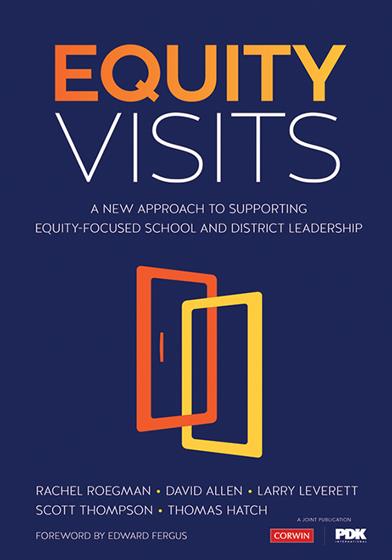Hands-on, Practical Guidance for Educators
From math,
literacy, science, equity, multilingual learners, and SEL, to assessment, school counseling,
and education leadership, our books are research-based and authored by experts
on topics most relevant to what educators are facing today.

Equity Visits
Foreword by Edward Fergus
A Joint Publication with Phi Delta Kappa
- Grade Level: PreK-12
- ISBN: 9781544338132
- Published By: Corwin
- Year: 2019
- Page Count: 192
- Publication date: August 27, 2019
Review Copies
Review copies may be requested by individuals planning to purchase 10 or more copies for a team or considering a book for adoption in a higher ed course. Request review copy
Description
Because equity and instruction are inextricably bound
Why are equity visits such a critical first step to increasing opportunity and access for our under-served students? Because they take instructional rounds to a new level, providing a powerful lens for investigating the intersections of equity and instruction. After all, how can we possibly deliver equitable learning experiences, opportunities, and outcomes for our students, without first pinpointing problems of practice?
That’s where Equity Visits will prove absolutely indispensable to district and school administrators. It details how to combine a strong focus on instruction with explicit, intentional efforts to address systemic inequities. Inside you’ll find
- A range of data collection activities and tools to target central issues of equity in your school
- Clear guidelines on how to investigate the ways instructional practices, structures, and beliefs lead to inequitable educational experiences—and how these are often masked in the day-to-day life of schools and districts
- A frank discussion of how to make race and racism an explicit part of investigating and addressing educational inequities
- Voices of school and district leaders who have taken crucial first steps to become “equity warriors”
- Recommendations on how to develop policies, initiatives, and practices to confront those inequities
Few dispute that instructional improvement must be a central focus of educational leadership, but for too long achieving educational equity has been absent from the conversation. Here is your opportunity to ensure equity occupy a central spot in data collection and analysis, and be explicitly discussed at all levels of your school or district organization. In short, essential reading and doing for all administrators!
Author(s)

Rachel Roegman
Rachel Roegman is an Assistant Professor of Educational Leadership in the Department of Education Policy, Organization and Leadership at the University of Illinois, Urbana-Champaign. Her research examines the support and development of equity-focused leaders. Her work has been influenced by her experiences as a middle school teacher in traditional and alternative schools in the San Francisco Unified School District, and her commitment to anti-racist, equity-focused practice.

David Allen
David Allen is an Associate Professor of English Education at the College of Staten Island, City University of New York (CUNY). His research focuses on how groups collaborate and create together, in schools and other settings. His most recent books include Protocols in the Classroom: Tools to Help Students Read, Write, Think, & Collaborate (with Tina Blythe, Alan, Dichter, and Terra Lynch, Teachers College Press), Facilitating for Learning: Tools for Teacher Groups of All Kinds (with Tina Blythe, Teachers College Press) and Powerful Teacher Learning: What the Theatre Arts Teach about Collaboration (Rowman & Littlefield Education).

Larry Leverett
Larry Leverett is one of the co-founders of NJNS and the former Executive Director of the Panasonic Foundation, a corporate foundation with a mission of partnering with public school systems and their communities to break the links between race, poverty, and educational outcomes so that all students are improving academically and socially. Prior to that, he was a school superintendent in Greenwich, Connecticut and Plainfield, New Jersey. Dr. Leverett is also a former district superintendent in Englewood, New Jersey, Plainfield, New Jersey, and Greenwich, Connecticut.

Scott Thompson
Scott Thompson is one of the co-founders of NJNS and served as Assistant Executive Director of the Panasonic Foundation for 22 years. His publications include Leading from the Eye of the Storm: Spirituality and Public School Improvement (Roman & Littlefield Education) and numerous chapters, articles, and reviews. Prior to joining Panasonic Foundation, Thompson was Director of Dissemination and Project Development at the Institute for Responsive Education, where he edited the national journal, New Schools, New Communities, published in collaboration with Corwin Press.

Thomas Hatch
Thomas Hatch (@tch960) is a Professor at Teachers College, Columbia University and Director of the National Center for Restructuring Education, Schools, and Teaching (NCREST). His research includes studies of school improvement efforts at the school, district, and national levels. His latest book, The Education We Need for a Future We Can’t Predict (Corwin, 2021), focuses on efforts to create more powerful learning experiences both inside and outside schools in developed and developing contexts. He is also the founder and managing editor of internationalednews.com. He previously served as a Senior Scholar at the Carnegie Foundation for the Advancement of Teaching. His other books include Managing to Change: How Schools can Survive (and Sometimes Thrive) in Turbulent Times (Teachers College Press, 2009); Into the Classroom: Developing the Scholarship of Teaching and Learning (Teachers College Press, 2005); and School Reform Behind the Scenes (Teachers College Press, 1999). Learn more about Tom and keep up with his latest blog posts at thomashatch.org.
Table of Contents
List of Figures
Foreword by Edward Fergus
Preface
Acknowledgments
About the Authors
INTRODUCTION • Needed: Equity-Focused Leaders
Leading for Equity in a Segregated State
Defining Equity-Focused Leadership
Developing Equity-Focused Leadership in New Jersey
Putting Equity and Instruction at the Center: Equity Visits
Overview of the Book
CHAPTER 1 • Developing Equity Visits
Missing: The Integration of Equity and Instruction
Shifting from Instruction to Equity and Instruction
Learning Lessons Across the Eras
CHAPTER 2 • A Detailed Look at Equity Visits
Core Elements of an Equity Visit
Revisiting the Core Elements
CHAPTER 3 • Equity-Focused Learning Communities
Learning About Equity in a Community
Putting Together Organizational Components of Sustained Learning Communities
Drawing on Organizational Tools
Building Supports for Equity-Focused Learning and Practice
CHAPTER 4 • Talking About Race and Racism
Acknowledging Race in PreK–12 Schools
Talking About Race in PreK–12 Schools
Different Challenges for Leaders of Color and for White Leaders
Challenges to Making Race Central to Discussions of Equity in Schools
Keeping Race at the Center of the Discussion
CHAPTER 5 • Lessons for Leaders Ready to Integrate Equity and Instruction
Implications for Individuals
Implications for School and Districts as Organizations
Implications for Leadership Preparation and Professional Development
ALL Means ALL
Appendices
Appendix A: Participating Superintendents and Their Districts
Appendix B: Resources
Appendix C: Tools for Conducting Equity Visits
Appendix D: Protocols
References
Index
Reviews
“Equity Visits provides practitioners with yet-another important tool that weaves together the elements of school structures that still require systematic dismantling as well as advancing the mental models of equity leadership vitally important for sustaining this work.”
Edward Fergus, Author of "Solving Disproportionality and Achieving Equity"“Equity Visits provides practitioners with yet-another important tool that weaves together the elements of school structures that still require systematic dismantling as well as advancing the mental models of equity leadership vitally important for sustaining this work.”
"Educational leaders will benefit from a deep dive into equitable systems with a focus on instructional practice explored in this book. The authors provide a wealth of practical strategies and step-by-step processes to implement Equity Visits."Eddie Ruiz, Assistant Superintendent Student Services, Equity & Access, School District of Palm Beach County
"Real equity work is about identifying, responding and transforming structures, policies, procedures, behaviors, and biases that denied access and opportunities to underserved students. The authors of Equity Visits provide a step in that direction. Having put 11 years of research and extensive fieldwork behind this project, the book provides a framework that spells out the specific steps in the process. It also provides protocols, samples, templates, and many other tools to facilitate its implementation."Waldo V. Alvarado, Director of Equity & Diversity, Reading School District
"The framework laid out in Equity Visits provides an extension to learning walks and instructional rounds that will deepen outcomes for participants and their schools. The tools and ideas presented in this manuscript are practical and provide guidance that facilitators and district teams can utilize."Ellen S. Perconti, Superintendent, Grapeview School Districts
"Equity Visits is a long overdue addition to the literature regarding equity and inclusion. It tackles complex issues that underlie the persistent underachievement of marginalized students and provides a leadership framework that supports system improvements."Maria G. Ott, Ph.D., Professor of Clinical Education, University of Southern California- Rossier School of Education
"Schools need tools to take a deep look at equity issues and take concrete actions. Leaders need guidance as well. Equity Visits takes a strong equity-anti-racist focus and provides concrete strategies at the system level as well as instructional strategies, courageous leadership, and a process for gathering and analyzing important data."Becki Cohn-Vargas, Ed.D, Educational Consultant, Coach, and Author, Cohn-Vargas Consulting
"Equity Visits provides an innovative practice to support district and school leaders as they address inequities in the schools and in the classrooms. The inclusion of practical tools and resources that can be adapted by readers as they embark on and carry out their own work on the topic are especially useful for practitioners out in the field."Carmella S. Franco, Ph.D, Author of "A Culturally Proficient Society Begins in School"
"Whether we like to admit it or not, student achievement, college entrance rates, etc. are unequal among subgroups of students. Our society in general is not giving our students, or us as educators, good models of how to talk about and address the issues. Equity Visits offers is a structure to realize the inequities that happen, a protocol to start collaborating in finding solutions, and a method for starting to accept and discuss the issue to find solutions using a team approach."Leslie Standerfer, High School Principal, Estrella Foothills High School
"Building on the concept of Instructional Rounds and the work of Courageous Conversations, Equity Visits is the perfect resource for schools and districts that are looking for ways to go deeper into race and equity in learning and keen to make an impact in their classrooms and schools."Sarah Zabel, Principal, Astor School
"The work shared in Equity Visits will help educators to be more purposeful in their work around providing equitable experiences for all students. The authors' approachable and informative writing style, their extensive research, and the inclusion of stories from fellow leaders make this work a more collaborative and reflective process. Doing Equity Visits will result in more positive outcomes in school improvements."Lena Marie Rockwood Assistant Principal, Revere Public Schools
"American education is at a crossroads. We must deliver on our obligation to educate all students at a high level or be prepared to put our country in decline. More children arrive at school burdened by poverty, by high rates of family mobility, as English language learners or members of other groups who have historically been underserved. We must make the choice to address the inequities that plague public education. This is a national imperative.
The good news is that this challenge can be met. There are school leaders and school systems where that work is being done, where equity is being talked about and delivered. These accomplished authors have provided thoughtful analysis, tools, suggestions, and a vision of what can be. Please read the book carefully. It is up to you—to each of us—to address the educational needs of the most diverse student population in our history. "
Jerry D.Weast, Founder & CEO"American education is at a crossroads. We must deliver on our obligation to educate all students at a high level or be prepared to put our country in decline. More children arrive at school burdened by poverty, by high rates of family mobility, as English language learners or members of other groups who have historically been underserved. We must make the choice to address the inequities that plague public education. This is a national imperative.
The good news is that this challenge can be met. There are school leaders and school systems where that work is being done, where equity is being talked about and delivered. These accomplished authors have provided thoughtful analysis, tools, suggestions, and a vision of what can be. Please read the book carefully. It is up to you—to each of us—to address the educational needs of the most diverse student population in our history. "
Partnership for Deliberate Excellence, LLC
"Today’s public school system leaders are responsible for transforming teaching and learning through an equity lens. The complexity of this work requires theoretical frameworks, stories of success and practical advice. The NJNS leaders and superintendents have provided an invaluable resource for those who not only want to learn about equity, but want to act. By focusing on the power of equity visits, Rogeman, Allen, Leverett, Thompson and Hatch
have given practitioners a set of tools and models that will enable them to start their own journeys of system transformation through an equity lens."
Joshua P. Starr Ph. D, CEO of PDK International"Today’s public school system leaders are responsible for transforming teaching and learning through an equity lens. The complexity of this work requires theoretical frameworks, stories of success and practical advice. The NJNS leaders and superintendents have provided an invaluable resource for those who not only want to learn about equity, but want to act. By focusing on the power of equity visits, Rogeman, Allen, Leverett, Thompson and Hatch
have given practitioners a set of tools and models that will enable them to start their own journeys of system transformation through an equity lens."
"Equity Visits documents the evolution of more than a decade of work among the New Jersey Network of Superintendents--from its focus on improvement of teaching and learning through instructional rounds, to visits with an explicit focus on improving equity practices. The book’s many tools will enable educational leaders to collaboratively investigate schools and districts to understand the specific practices and cultures that perpetuate inequity. After reading this book educational leaders will better appreciate that change, especially focused on eliminating inequities, is slow and hard; develop effective strategies for talking openly about racial and other inequities; be equipped to process defeats on the way to success; and nurture leadership of all to sustain equity work."Dr. Linnea Weiland, Department Chair of Elementary and Early Childhood Education, William Paterson University
"Equity Visits provides an essential addition to the growing canon of literature about public education and diversity, equity, and inclusion. Chronicling over a decade of experiences of equity warrior teams, the authors capture the ups and downs of leaders who work across silos to brainstorm and try systemic solutions for the persistent structural and systemic diseases of racism, poverty, and kids left behind."Perry Chen, Education Strategy Consultant, Oakland Unified School District
"As transformational educational leaders, our daily task is to insure that 'demography isn’t destiny' for the children we serve. Equity Visits provides a proven strategy for engaging leaders in the work of identifying and dismantling structures and policies that preclude high achievement, while sharing and promoting those practices that enhance students’ success. Through this book, readers will deepen their understanding that the pursuit of excellence must be our goal and equity must be the strategy we use to attain it."
Deborah Jewell-Sherman, Ed.D."As transformational educational leaders, our daily task is to insure that 'demography isn’t destiny' for the children we serve. Equity Visits provides a proven strategy for engaging leaders in the work of identifying and dismantling structures and policies that preclude high achievement, while sharing and promoting those practices that enhance students’ success. Through this book, readers will deepen their understanding that the pursuit of excellence must be our goal and equity must be the strategy we use to attain it."
The Gregory R. Anrig Professor for Education Leadership, Harvard Graduate School of Education
Review Copies
Review copies may be requested by individuals planning to purchase 10 or more copies for a team or considering a book for adoption in a higher ed course. Request review copy
Related Resources
- Access to companion resources is available with the purchase of this book.
Join us for the Visible Learning
Conference in Las Vegas!
Experience groundbreaking research, inspiring speakers,
and transformative networking. Register Now.

